Scott Timberg's Blog, page 20
December 11, 2014
Brad Mehldau and the Bad Plus in Northridge
IT was no surprise that two of the greatest trios in jazz today put on bracing and powerful sets. What was new was that these two groups performed in the San Fernando Valley, an enormous swatch of suburbia that has often lagged behind the rest of Los Angeles for most kinds of culture. (As Easterners have often looked down on LA, Angelenos have typically looked down on the Valley.) Plenty of jazz musicians and other luminaries have lived in the Valley, and there have been some decent jazz clubs.
But it’s only in the last few years that there has been a major venue to offer classical music, ballet, jazz and so on. The Valley Performing Arts Center, on the campus of Cal State Northridge, offers a 1,700 Great Hall with warm acoustics and a sleek (but not cold) modern design. It’s a LEED Gold building with a lot of handsome wood (Anigre, similar to maple), an expansive lobby that makes pre- and post-concert socializing easy, and nicely manicured outdoor space.
I was there, of course, mostly for the music.
I knew Mehldau’s group, which builds on the work of Bill Evans’s forceful and sensitive early-’60s trio. The opening number, “Spiral,” a song Mehldau wrote but has not yet recorded, captures exactly what I like about this group: Brooding, more tension than release, the song burrow into itself as if the pianist is working through something deep. His bassist, Larry Grenadier, is one of the best, most expressive players in the business. The trio played only a few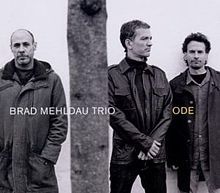 songs (including Elmo Hope’s uptempo, boppish “Dee-Dah,” which they played at Disney Hall not long ago.)
songs (including Elmo Hope’s uptempo, boppish “Dee-Dah,” which they played at Disney Hall not long ago.)
They closed with a relaxed, funky number. I’ve seen Mehldau play nearly 10 times, and with the exception of one unhinged night at the old Largo, this is as good as I’ve ever seen him. He was relaxed, the acoustics make the music very present, and the chemistry between the members of the trio very strong.
The Bad Plus are — like Mehldau’s group — Gen Xers committed to mid-century jazz but also interested in rock music: They’ve covered Nirvana and Blondie just as the more melancholic pianist has offered memorable versions of Radiohead and Nick Drake. This was, in other words, a very natural double bill.
But when the Bad Plus (right) took the stage and started to play, they made Mehldau and company seem like jazz traditionalists. With more assertive percussion, a more forceful rhythmic approach, a tendency toward long vamps, and a wry/oddball sense of humor in the betweens-song banter, it became clear how these guys have reached rock fans.
Most of the songs came from the group’s new LP, Inevitable Western, the highlight for me was the urgent “Gold Prisms Incorporated.” For some songs, David King’s drumming dominated. But the laconic bassist Reid Anderson, a Minnesotan with hangdog, deadpan delivery, was another stunningly lyrical player. I’ve got a number of this group’s records, but seeing them live really emphasized their virtuosity rather than just the shapes of the songs.
Iverson finds unlikely, knotty little notes and figures within the chord. The group calls itself “a leaderless trio,” and it’s largely true, though Iverson has distinguished himself not only as one of his generation’s leading pianists, but as a smart writer on jazz as well. (He’s a sort of goateed, jazzbo Jeremy Denk.)
The audience — appreciative but a bit sparse at first — filled in as the night went on, and there seemed to be plenty of students.
It’s not quite as easy to deal with a show at the Valley PAC as it is to roll into, say, Disney Hall. You either take a shuttle from a lot or walk about 10 minutes from another one. I have a terrible sense of direction, though, and found my way to and from it fine — especially thanks to a helpful usher stationed on campus.
Here’s hoping this isn’t the last time jazz artists of this caliber play to large audiences in the Valley.
December 10, 2014
Culture Crash The Book Hits NYC
OUR Department of Self-Promotion is happy to announce an event at McNally Jackson in SoHo on Weds. January 21. Sponsored by Salon, the evening will involve me discussing Culture Crash alongside author Elizabeth Wurtzel (pictured), whose upcoming book, Creatocracy: How the Constitution Invented Hollywood, shares some concerns with mine.
The bookstore is on Prince Street, near the Spring Street and Bowery stops. My New York friends swear by this place — I see Martin Amis was just there — and it’s a real honor to be invited.
I’m going to try to make a simple schedule of all the public events around Culture Crash.
December 9, 2014
Will Nashville’s Gentrification Destroy Its Music Scene?
ONE of the most pressing issues for culture-makers (and fellow travelers, like your humble blogger) is rapid gentrification. Often driven by the arrival or artists and musicians to a neighborhood or city, winner-take-all capitalism often means that investors and Trump-like developers arrive soon after and squeeze out the creative class and the middle class very soon after.
Recently I spoke on the radio about this process in Los Angeles; it’s taken place in London, New York, the Bay Area (where it has shuttered rock and electronica clubs) and elsewhere.
Nashville is decades into being an important music town and a few years into being a very “hot,” GQ-approved city, and these two tendencies seem to now be at war. The near-death of local legend Studio A — nearly turned into a condo complex — has provoked a “long-simmering debate about gentrification, local culture and the fast-changing face of a city that, until the last decade or so, seemed frozen in time.”
That’s according to Nashville Scene staffer Steve Haruch, who writes in the New York Times:
Neighborhoods close to downtown once drew teachers, writers and musicians with well-built, well-priced Craftsman homes. But with the influx of wealth has come a new kind of buyer, often an investor offering cash well above asking price. A house that went for $40,000 a decade ago might now go for 15 times that amount.
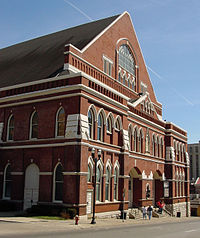
Ryman Auditorium
Even worse, for many of these new gentrifiers, the old Craftsman homes are just too small, so developers have been buying up these small houses, then demolishing and replacing them with much larger ones.
Leonard Cohen, who recorded two of his best albums in Nashville, once sang, “We are ugly, but we have the music.” After every block is lined with towering fake bungalows, after every dive bar is either plowed under or rebranded with artisanal cocktails, after every plank of reclaimed barn wood has been upcycled to provide ambience for boutique comfort food that only the already-comfortable can afford, after every bit of character has been scrubbed out of the alleys and arcades, we may wonder if Music City still has the music after all, and ponder what we lost when we gazed into our gleaming new towers and fell in love with the reflection.
In every city, it happens a bit differently. But when we organize our economic system to leave creative people out, destabilize the middle class, and to bring enormous wealth to a tiny minority, this kind of thing becomes nearly inevitable.
December 8, 2014
The New Republic is Not About Politics
FOR a few days now, I’ve been discussing the ideology of one of the nation’s most storied magazines, with friends on both left and right; for many, it’s best known as a policy journal. But the reason I am most saddened by the destruction of a great publication by a Silicon Valley coup has nothing to to with politics, no matter how valuable TNR was to American liberalism (a tradition I value greatly.) I’m angry because of Malcolm Cowley (right) — the elegant literary critic/ memoirist who is one of many great figures from the magazine’s cultural side, and has served as an inspiration to me as a writer from college to the present.
The survival of an informed, fair, artfully written discourse outside the academy is vastly important to me, perhaps rivaled only by a serious and healthy environment for the arts and letters. Both are in short supply these days, despite the explosion of blogs, sites, and everything else. While every issue of TNR may not have reached the heights established by the author of Exile’s Return, that great book that chronicled the Lost Generation writers, it was often one of the most vital voices in the larger conversation. Like Cowley (who J. Edgar Hoover tried to get fired), I am to the left of the magazine that once helped torpedo national healthcare, for instance. But this is less crucial to me. (A friend has suggested that TNR was in some ways “two magazines.”) There is plenty of political opinion available, on all sides of the spectrum, online.
Anyone who cares about culture and discourse should lament the implosion of this magazine by new owners who crow about “disruption” and “branding” — incisive Jonathan Chait piece here — regardless of their politics. “Conservatives need a liberal magazine that’s unpredictable enough to make them want to read it,” historian and former TNR editor David Greenberg wrote. “Liberals and leftists need a magazine that will prod them to question their beliefs, and revise or strengthen them. All of us need robust intellectual debate of a high caliber that treats politics and ideas with the seriousness that they deserve.”
So while I do regret that one of the key journals of the center-left has been radically redrawn — and that it will now publish less often — I find myself mostly agreeing with a commentator in some ways very different from me, the Catholic conservative Ross Douthat. He writes in the New York Times:
The New Republic as-it-was, the magazine I and others grew up reading, was emphatically not just a “policy magazine.” It was, instead, a publication that deliberately integrated its policy writing with often-extraordinary coverage of literature, philosophy, history, religion, music, fine art.
It wasn’t just a liberal magazine, in other words; it was a liberal-arts magazine, which unlike many of today’s online ventures never left its readers with the delusion that literary style or intellectual ambition were of secondary importance, or that today’s fashions represented permanent truths.
Unlike our era’s ascendant data journalism, it also never implied that technocracy was somehow a self-sustaining proposition, or that a utilitarianism of policy inputs and social outcomes suffices to understand every area of life.
The recent 100th anniversary issue reminded us how much tension had often existed between respective owners and the editors; Ric Hertzberg’s essay made this especially clear. But this nonsense with the new ownership is something different.
Some talk about the magazine declining lately, but I found a lot of memorable writing there, including Jed Perl’s art criticism and William Deresiewicz’s controversial and widely read “Excellent Sheep” essay about the narrowness of Ivy League education.
TNR’s new CEO, Guy Vidra, replicated all the right Silicon Valley buzzword when he talked about wanting to “break shit.” Well, he certainly has. He and the new owner wanted a “vertically integrated tech company,” and what they’ve got now is a smoking ruin.
Is First-Person Narrative Killing Discourse?
OVER the last two weeks I’ve been speaking about tradition with a number of accomplished women. My final installment includes a bit of a twist: The essayist Meghan Daum told me about a tradition she considers dangerous. Overuse of the “I” in storytelling is crowding out the larger world, she says.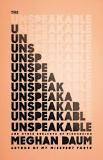
…I feel like 70 percent of what people share on Facebook are personal essays. A lot of them are by women, writing about their experiences, and a lot of them are fantastic and smart, and rigorously thought through. But others, because of the pace of digital media, have the opportunity to rush and write something and then have something quote-unquote published. We’ve all done that; I’ve done that. I’m not casting aspersions on anybody. But that’s a real danger. Part of the process is having a process, and having an editor, and writing several drafts and having time pass before writing about this experience. The Internet has allowed a lot of first drafts to go out into the world. And when those are first-person, sometimes you get stuff that’s uncooked.
She also talks about the journalistic stakes, the role of feminism, the Rolling Stone rape scandal, how this works through the generations, and the triumph of Joan Didion.
Daum’s full piece is worth reading, and don’t miss her new book, The Unspeakable.
December 5, 2014
CultureCrash at LA Central Library
ON the night of my book’s publication — January 13 — I will be part of the ALOUD series in downtown Los Angeles. This is one of the best literary series I know — I’ve interviewed authors for it and watched from the audience — so it’s a real honor to launch my book there.
With me will be the Silver Lake architect Barbara Bestor and the Bay Area rock musician John McCrea of Cake — both are interviewed in the book, talking about their respective fields. And dance writer/USC professor Sasha Anawalt will be herding these three cats as moderator.
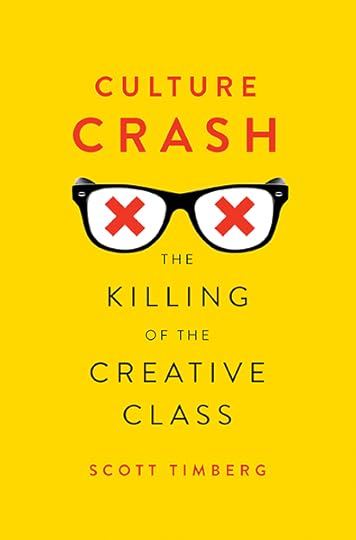 Here is the event announcement; you can now reserve spots. Hope to see you there.
Here is the event announcement; you can now reserve spots. Hope to see you there.
And announcements are coming for DC, New York, and perhaps one or two more on the West Coast.
Gillian Welch on Tragic Old Folk Songs
WHY do people make art, write songs, tell stories? Partly, it’s to deal with pain and suffering. This week I spoke to one of my musical heroes about the lineage of dark, gloomy folk songs from the American South — many of them originating in the British Isles, from Child Ballads and the like.
Here is what Welch had to say about the tradition of tragedy. She starts off this way:
I want to talk about the tradition of tragedy in Southern folk music. This tradition connects with why people make art – to deal with the gnarliest, most painful events that occur. Things beyond your control, almost beyond human understanding. This is why we sing about them: the sinking of the Titanic, hurricanes, rapes, assassination, murder, suicide, drugs …
Music used to be the be-all and end-all of entertainment and art, for the populace, back before TV and movies. Obviously there were books and stuff, but movies were much more inclusive. Now, in our popular culture, most people who have heavier subjects put it in a film or in a miniseries. Music is no longer the place to deal with things like, “My mother died,” which it used to be.
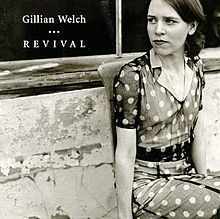 Welch, and her musical partner David Rawlings, are very near the top of my favorite living musicians. (I played, with an old band, three or four of their songs on guitar, and study Rawlings playing as closely as I can.)
Welch, and her musical partner David Rawlings, are very near the top of my favorite living musicians. (I played, with an old band, three or four of their songs on guitar, and study Rawlings playing as closely as I can.)
Very eager to see what Welch and company come up with next, as they bring this tradition into the 21st century.
December 4, 2014
Bettye LaVette on the Holidays
I CAUGHT the soul singer in a playful mood the other day when I called to talk to her about a tradition she took seriously. LaVette chose to talk about her zealotry for celebrating Christmas and other holidays. She went off on a number of tangents, and covered the whole emotional range we associate with the blues. Here’s part of it.
It’s certainly a time of reminiscing for me. Every holiday makes me think of all the other holidays. As you get older, you tend to be more reminiscing anyway – crying and reminiscing. I’m kind of melancholy all the time, anyway – I think I live my life in B-flat minor. But these days I think I’m going deeper into it – bringing in the cellos and everything.
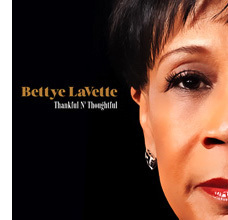 Her records I’ve Got My Own Hell to Raise and The Scene of the Crime are damn near masterpieces., and there are some wonderful songs on Thankful N Thoughtful. She has excellent and unexpected taste in material, and a rich, expressive voice that won’t quit.
Her records I’ve Got My Own Hell to Raise and The Scene of the Crime are damn near masterpieces., and there are some wonderful songs on Thankful N Thoughtful. She has excellent and unexpected taste in material, and a rich, expressive voice that won’t quit.
I’m excited to report that LaVette’s got an album coming in January and, I’m hoping, a tour.
December 3, 2014
The War on Drugs and Mexico’s 43 Students
WHEN I was in Puebla, Mexico, a few weeks back, the story of the 43 missing students — thought to have been murdered by a collusion between a drug gang and government officials in Guerrero — was heating up and protests were beginning. To some, they are the latest victims of the War on Drugs launched, and largely maintained, by the U.S.
Part of what was interesting about the conference I attended — La Ciudad de las Ideas, vaguely based on Aspen — was that nearly everyone seemed to think that the War on Drugs had been a disaster, especially for Mexico. This was true even of one of the festival sponsors, media mogul Ricardo Salinas, and when he and other speakers talked about the damage it had done, the response from the crowd was enormous.
The most direct engagement with the issue cam from the speaker Ethan Nadelmann, whose address at the conference was crisp, energetic and persuasive. Founder of the Drug Policy Alliance, Nadelmann began with: “I want to apologize, as an American, for the havoc that my country has wreaked on Mexico” and other countries of Latin America through its drug war. He described his apology as delivered “in the spirit of a North American brother.”
The War on Drugs — launched, effectively, by the Nixon administration, and amped up by Pres. Reagan — was brought to you by the same country that had so much success with Prohibition, Nadelmann pointed out. It’s played a major role in pu tting 2.3 Americans behind bars, in state and federal prisons. It’s done enormous damage both at home and abroad, and has — in the way the mafia thrived during our Prohibition — build a robust network of organized crime across Latin America.
tting 2.3 Americans behind bars, in state and federal prisons. It’s done enormous damage both at home and abroad, and has — in the way the mafia thrived during our Prohibition — build a robust network of organized crime across Latin America.
Mexico, Nadelmann said, seemed to be at a crossroads moment, where it might follow the lead of California and other liberal states that have begun to decriminalize marijuana (which has consumed the majority of resources in the fight), or might double-down on its cat and mouse game. (The Atlantic reports 50,000 deaths from Mexico’s version of the War on Drugs from 2006 to ’12 alone; other estimates are considerably higher.)
For what it’s worth, I’m currently reading Eric Schlosser’s Reefer Madness, which looks at paranoia and government overreach in dealing with pot, as well as other aspects of the underground economy. Incredible and dispiriting tale.
I don’t have a recording of Nadelmann’s excellent address, but here’s at TED talk he gave in October. It’s time to take this argument seriously.
Anne Lamott on Forgiveness
THE essayist, Christian, feminist and political progressive is the latest subject of the Trust Me On This series I’m handling for Salon. The Bay-Area-based Lamott, perhaps best known for the book Bird by Bird, spoke to me about a subject central to her new collection, Small Victories — forgiveness. Here is the story.
Turns out that while she knows forgiveness is important to her, it doesn’t come easy. 
Forgiveness has become a pursuit more important to me than almost anything. Because as I said in an old book, it’s not my strong suit. I always joke that I wasn’t one of those Christians who was heavily into forgiveness – that I was the other kind; that I was reform. But it’s so awful to be a person who doesn’t forgive; in my experience the willingness to change down deep always comes from the pain of not changing… I really believe that earth is forgiveness school – I really believe that’s why they brought us here, and then left us without any owner’s manual.
Her whole piece — which came out of discussion with yours truly — is worth reading. I’ve got a few more of these coming before the week is out.
Scott Timberg's Blog
- Scott Timberg's profile
- 7 followers





